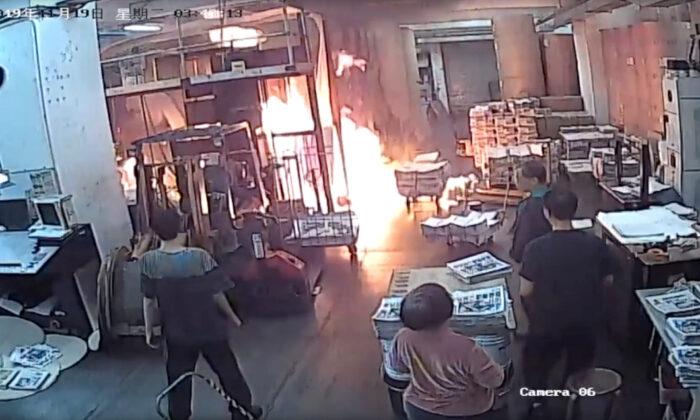The Epoch Times has been conducting an internal review into the Nov. 19, 2019, arson attack on the print shop used by the Hong Kong edition of The Epoch Times.
The attack took place at 3:50 a.m. local time, when four individuals dressed in black and wearing facial masks, two of them armed with batons, entered the print shop through a corridor connected to the loading dock of the warehouse in which the print shop is located.
The door of the print shop connected to the corridor had been opened at 3:43 a.m., when a staff member started to move pallets of newspapers for the morning delivery.
According to a security guard working at the complex in which the print shop is located, the four men had been waiting in a van outside, before entering the print shop minutes after its door had been opened.
Upon entering the print shop, the men started shouting at the workers there, then proceeded to throw a flammable liquid onto one of the printing machines and its paper roll and set them on fire, before running off. The fire triggered the sprinkler system, and one of the staff members used a fire extinguisher to help put out the fire.
Firefighters arrived on the scene at 4:11 a.m. Local police arrived a few minutes later.
Surveillance video footage of the incident was captured by three different cameras. Below is footage capturing the incident from the most relevant camera angle. The faces of some of the print shop workers have been blurred for privacy reasons.
Print Shop Staff Initially Thought the Intruders Were Protesters
A day prior to the incident, there had been protests near the print shop. The print shop staff initially believed the arsonists were protesters and greeted them without suspicion, because the men were dressed similarly to the protesters, only to be shocked when they carried out the arson.Damage Caused to Printing Press
The fire damaged a printing press, two paper-feeding machines called “splicers,” four rolls of printing paper, and many bundles of newspapers. As can be seen in the video above, sprinklers activated by the fire soaked machines, rolls of paper, and stacks of newspaper.Hong Kong Police Investigation
Local police responded to the incident on site, where they collected basic information on the incident from the print shop staff. This investigation was captured by the shop’s surveillance cameras (see video above).Surveillance footage of the arson incident was submitted to the police.
Background on Hong Kong Police
There have been frequent media reports suggesting that Hong Kong police have impersonated protesters.Amnesty International has repeatedly called for an “independent and impartial investigation into the behavior of the Hong Kong police.” It refers to the judgment of a panel of overseas experts who believe the existing governmental mechanism for investigating police misconduct lacks “the powers, capacity and independent investigative capability” to do an adequate job.
Context of The Epoch Times Operating in China
The Chinese Communist Party (CCP) has worked to silence The Epoch Times since the paper first began publishing in the year 2000, because of its reporting on the human rights record of the Chinese regime and on criticism of the CCP. Shortly after the newspaper’s founding in the United States, 10 staff members working underground in China were jailed and sentenced to prison terms ranging from three to 10 years, for charges like “inciting subversion of the state power.”In the United States and other countries, Chinese embassies and consulates have worked to try to discourage businesses from advertising with the newspaper. The family members of U.S.-based Epoch Times staff have been threatened in China. There have been numerous instances in which of bundles of newspapers were stolen or destroyed; though the identities of the perpetrators are difficult to verify, these incidents fit a general pattern of harassment by the Chinese regime.
Recent examples in Hong Kong are illustrative. Ms. Lu, the Hong Kong edition’s circulation manager, said that in April, a popular convenience store in Hong Kong tore up a contract for selling The Epoch Times under pressure from the CCP, despite that sales of the newspaper had exceeded the contract requirements. Lu also said there have been incidents of intimidation of journalists from time to time.
The arson on the 19th is the fourth attack on The Epoch Times’ print shop in Hong Kong. In February 2006, thugs broke in and attempted to smash the printers. In October 2012, thugs attempted to break in but could not smash open the gate. In December 2012, seven men carrying multiple toolboxes appeared and began attempting to break through the gate. They fled after police were called.
The protests in Hong Kong have been an attempt to defend the fundamental liberties of the people of Hong Kong. The people of Hong Kong feel that if they don’t protest now, the CCP will force its tyranny over this formerly free city.
This attack on The Epoch Times was an attempt to deny to the Hong Kong people a free press.






Friends Read Free